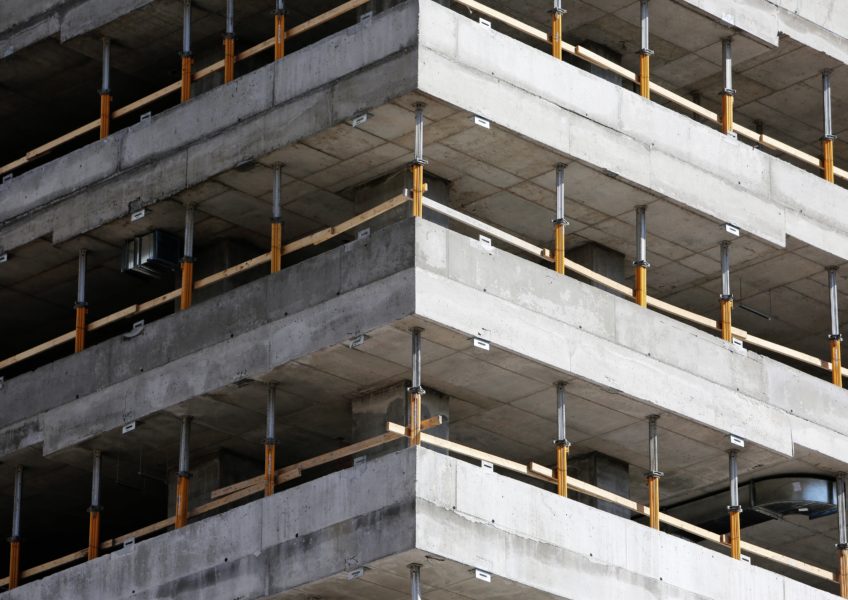Why West Coast General Engineering commercial concrete is the Best Choice for Challenging Construction Environments
Why West Coast General Engineering commercial concrete is the Best Choice for Challenging Construction Environments
Blog Article
The Important Role of Concrete Foundation in Structural Honesty and Long Life
When it involves developing a residential property, the structure is a lot more vital than you may think. Concrete foundations supply unrivaled strength and sturdiness, guaranteeing your framework can endure various ecological obstacles. Without a solid base, you run the risk of potential concerns like moving or fracturing, which can compromise safety and security and worth. Comprehending the subtleties of concrete foundations might be the trick to maintaining your investment for many years to find. What should you consider next?
Understanding the Value of Concrete Foundations
Concrete foundations are essential to the total stability of any structure, as they give the vital support required to stand up to numerous loads and ecological problems. When you think of constructing a home or a commercial area, the foundation is the initial point you must consider. It works as a barrier against moisture, protecting your home from water damage. A well-placed concrete structure additionally stops settling and changing, which can bring about cracks in wall surfaces and floorings. You'll intend to ensure that the foundation is appropriately made and enhanced, as this influences the durability of your building. In addition, a strong structure can boost energy efficiency by minimizing air leakages. Keep in mind, neglecting the importance of a concrete structure can bring about costly fixings down the line. Investing in a top quality foundation upfront is important for the honesty and durability of your structure.
Benefits of Concrete Foundations for Structural Integrity
While many aspects add to a building's structural integrity, concrete structures provide unequaled toughness and toughness. You'll value that concrete can hold up against severe weather conditions, withstanding both dampness and temperature level changes. This strength means your framework is much less most likely to experience breaking or changing with time, which can endanger its safety.Additionally, concrete's fundamental weight offers a strong base, protecting against motion throughout natural events like earthquakes or floods. When you select a concrete foundation, you're also going with reduced upkeep; unlike timber, it won't rot or bring in insects, conserving you money and time in repairs.Moreover, concrete's fire resistance provides added safety, guaranteeing your structure can endure high temperatures without considerable damage. On the whole, spending in a concrete foundation implies you're focusing on the lasting stability and integrity of your building, making it a smart selection for any type of building and construction project.
Usual Kinds Of Concrete Foundations
When it concerns developing structures, understanding the common types of concrete foundations can assist you make notified selections for your project. The most widespread types include slab-on-grade, crawl room, and complete basement foundations.A slab-on-grade structure is a straightforward, affordable choice, where a thick concrete slab is put directly on the ground. This type works well in warm climates, as it lessens warm loss.Crawl area structures boost the home somewhat above ground, permitting ventilation and access to pipes and electric systems. This layout can help prevent dampness issues.Full basement structures provide added living or storage room while giving superb structural assistance. They require more excavation and are generally utilized in colder climates to avoid frost heave.
Elements to Take Into Consideration When Designing a Concrete Foundation

Finest Practices for Setting Up Concrete Foundations
When you're installing a concrete structure, appropriate website prep work is important to guarantee security (West Coast General Engineering concrete foundation Rancho Cucamonga). You'll additionally require to understand support strategies to improve strength and sturdiness. Lastly, don't ignore the healing procedure, as it plays a basic role in attaining a strong structure
Site Preparation Relevance
It might appear straightforward, proper site prep work is vital for ensuring a solid and sturdy concrete foundation. Begin by getting rid of the area of any kind of particles, greenery, or organic product that could endanger the structure's honesty. Next, analyze the soil type and compaction; you might need to excavate or include products to produce a secure base. Degree the ground to assure even weight circulation and stay clear of settling concerns later. Setting up proper drain systems is also vital to avoid water accumulation, which can compromise the foundation in time. Mark out the structure's measurements accurately to guide the putting process. By adhering to these steps, you'll set the stage for an effective concrete foundation that stands the test of time.
Support Strategies Explained
Once the website is effectively prepared, the next action in ensuring a sturdy concrete structure involves carrying out reliable reinforcement techniques. You must begin by utilizing steel rebar, which offers tensile stamina and aids protect against splitting. Lay the rebar in a grid pattern, seeing to it it rises utilizing spacers to preserve appropriate protection. In addition, take into consideration making use of cable mesh for extra assistance, particularly in locations subject to heavy loads. Do not neglect to link the rebar crossways safely with wire. For bigger structures, fiber reinforcement can enhance durability, lowering the threat of shrinking splits. Always comply with neighborhood building ordinance and guidelines to ensure conformity. By using these support methods, you'll considerably enhance your structure's toughness and long life, laying a strong groundwork for your structure.
Healing Process Essentials
To guarantee your concrete structure cures effectively, it is necessary to keep adequate wetness and temperature problems right away after pouring. Start by covering the surface area with a wet burlap or plastic sheet to keep dampness. This keeps the concrete hydrated, preventing fractures and making certain strength. You need to likewise keep an eye on the temperature level; suitable healing problems are in between 50 ° F and 90 ° F. If it's too warm, mist the surface area on a regular basis to stop quick dissipation. For winter, take into consideration using insulating coverings my latest blog post to keep warmth. Go for a healing duration of a minimum of 7 days, as this is vital for optimum toughness growth. By complying with these best practices, you'll boost your foundation's toughness and Recommended Reading long life, making certain architectural stability for years to find.
Maintenance of Concrete Structures for Durability
To maintain your concrete structure strong and enduring, routine assessments are crucial. You must likewise guarantee reliable drainage solutions are in location to avoid water damages. If you find any kind of splits, addressing them without delay will save you from bigger troubles down the line.

Regular Assessments and Analyses
While routine assessments and analyses might appear like a job, they're crucial for keeping the stability of your concrete foundation. By routinely looking for cracks, shifts, or indicators of wear, you can capture potential problems prior to they escalate right into pricey repair services. Try to find any type of water merging around the structure or unusual settling, as these can signify underlying problems. It's also important to monitor any adjustments in your house's framework, like doors that stick or windows that don't open smoothly. Maintaining a record of your examinations helps track adjustments over time, allowing for positive maintenance. Eventually, these analyses assure your foundation stays steady, supporting the longevity and security of your whole structure. Do not forget this critical element of homeownership!
Effective Drainage Solutions
Regular examinations can disclose issues like drain issues that could compromise your concrete foundation's security. To protect against water build-up, assure your seamless gutters and downspouts straight water away from the structure. Installing French drains can efficiently redirect surface area and groundwater, reducing stress on your foundation walls. Additionally, grading the dirt around your home assists ensure that water streams away, as opposed to merging near your foundation.Consider using sump pumps in locations vulnerable to flooding, as they proactively remove excess water. Consistently inspect for blockages in drain systems and clear them promptly. You'll secure your foundation's honesty and longevity by taking these aggressive measures. Bear in mind, efficient water drainage remedies are crucial for maintaining a solid, durable concrete foundation.
Prompt Fracture Repair Works
When you discover fractures in your concrete structure, resolving them quickly is crucial for maintaining its long life. Little fractures can swiftly progress right into larger problems, jeopardizing the structural integrity of your home. On a regular basis check your structure for indicators of damage, such as straight or upright cracks. If you find any type of, don't wait-- repair them right away. You can use epoxy injections or concrete patching substances, which work for securing fractures. Constantly comply with the producer's instructions and consider consulting an expert for considerable damages. Remember, prompt repair work not click here for more just improve your foundation's longevity however additionally conserve you cash in the lengthy run by preventing more comprehensive repair work down the line. Remain positive, and your foundation will certainly stay solid and safe and secure.
Dealing With Common Problems With Concrete Foundations
Concrete foundations can deal with various problems with time, making it critical to recognize and resolve them quickly. One of the most common problems is fracturing, which can happen due to temperature level variations or settling dirt. If you discover fractures, it's vital to evaluate their dimension and depth; small splits can typically be secured, while bigger ones may require specialist evaluation.Water invasion is another significant worry. Excess moisture can result in mold growth and architectural degeneration. Warranty correct water drainage around your foundation to reduce this risk. Furthermore, look for indicators of moving or bowing walls, as this can indicate underlying concerns with your structure's stability.Regular evaluations are basic to catch these troubles early. If you spot any type of concerning indications, don't hesitate to seek advice from a structure expert. By remaining aggressive, you can maintain the honesty and long life of your concrete structure, guaranteeing your home remains secure and protected.
Regularly Asked Questions
Just How Does Dirt Kind Affect Concrete Structure Efficiency?
Soil type considerably impacts concrete foundation efficiency. If you've obtained large clay, for circumstances, it can trigger shifting and fracturing. Sandy dirt may bring about settling. Comprehending your dirt aids assure a stable foundation.
Can Concrete Foundations Be Repaired if Damaged?
Yes, you can repair broken concrete foundations. Depending upon the extent of the damage, strategies like epoxy shot or slab jacking can restore security. It's ideal to get in touch with a professional for effective options.
What Is the Typical Life Expectancy of a Concrete Foundation?
A concrete structure normally lasts 30 to 100 years, relying on elements like dirt problems, climate, and upkeep. You'll intend to watch on it to ensure it remains healthy throughout its lifespan.
Are There Alternative Products to Concrete for Foundations?
Yes, there are alternatives to concrete for foundations, like steel, timber, or even recycled products. Each option has one-of-a-kind advantages and drawbacks, so you need to consider your task's particular requirements when picking the best material.
How Does Environment Impact Concrete Structure Longevity?
Climate considerably affects concrete structure resilience (West Coast GE Concrete contractors). Extreme temperatures, moisture, and freeze-thaw cycles can deteriorate the product, causing fractures and structural problems. You must take into consideration regional environment conditions when preparing your structure to guarantee long-lasting efficiency
Report this page